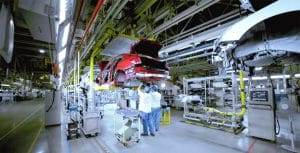
Some cities in southern China are offering subsidies hoping to lure potential buyers back to dealerships in the wake of the coronavirus.
New vehicle sales in China were already slumping this year prior to the coronavirus outbreak, and now some Chinese municipalities are reverting to a tried-and-true method to spur auto sales: subsidies.
Sales were predicted to fall 2% in 2020, but the China Association of Automobile Manufacturers (CAAM) reported an 18.7% decline in January, due in part to the virus. Midway through February, the bottom dropped out, sales plummeting 92%.
In response, some cities are offering incentives to lure people back to dealership in large cities with where manufacturers have operations. The coronavirus has killed more than 2,800 people in China and forced the temporary shutdown of many factories last month.
(Geneva Motor Show back on — sort of.)
The city of Guangzhou expects to reintroduce incentives for electric vehicles, Reuters reported. The city, located in the south of the country, is home to Toyota, Honda and Nissan joint ventures with Chinese partners.

Currently new car dealerships in China are a “ghost town,” and incentives may not have the impact local governments hope.
Foshan, near Guangzhou, is home to a venture between Volkswagen and FAW Group, moved early, announcing last month that it would offer cash of 2,000 yuan for purchases of new cars and 3,000 yuan for replacement of existing cars.
Foshan’s government said it will also offer subsidies to help offset the marketing expenses of auto companies. Xiangtan, in the southern province of Hunan, is offer potential buyers 3,000 yuan ($429) in cash if they buy a car made locally by Geely, state media Hunan Daily reported on Sunday.
The subsidies may be designed to spur sales, but there is some question about how much new product will be available — and for how long. Once dealers run out of a type of vehicle, replacements maybe unavailable since plants have been down, although some announced they would be reopening their facilities.
“It’s one thing to say a factory is open. It’s another thing to say it’s in production,” Michael Dunne, head of ZoZoGo, an automotive consulting service focused on China and other Asian markets, told TheDetroitBureau.com. He added his sources claim barely 30% of auto factory and office workers are actually reporting to work.
(Coronavirus crushing China car sales in February.)
“The most dramatic impact is on the retail side of the business. Dealers are ghost towns. Nobody is going to dealers,” which means that the optimistic industry forecast for a quick sales recovery is highly unlikely, Dunne noted.
Additionally, those subsidies only account for some large cities in the southern region of the country. It doesn’t account for the rest of the country, which may still be suffering from the spread of the infection. Dunne noted.

Some auto plants are just now reopening with initial estimates having things back to full production by March 10.
The discovery of a “concentrated outbreak” on the west side of Beijing is extremely worrisome, especially for Chinese confidence in the Xu Jinping government because he had made a point of saying they would keep the epidemic out of the nation’s capital.
Car sales in China, the world’s biggest car market, have been falling for the past two years, with an 8.2% slide last year. This year’s results were supposed to be improved, but the impact of the outbreak is definitely causing a revision of forecasts.
Peter Nagle, senior researcher at IHS Markit, said the company has “taken out almost 897,000 units from our China outlook for 2020 with the expectation that the virus is controlled and most plants return to full capacity by the end of March.”
Currently, the quarantine for major joint ventures operating outside of Hubei province is expected to end today. Within Hubei, IHS expects production will resume some time after March 10.
(China’s coronavirus crisis could cripple car production in the U.S.)
“Overall, we anticipate China sales to come in around 23.7 million units in 2020 or about 4.4% lower than the 24.8 million units in 2019. If the shutdowns persist beyond March, we could see sales fall up to 1.6 million below pre-crisis forecast and barely approach 23 million units.”
